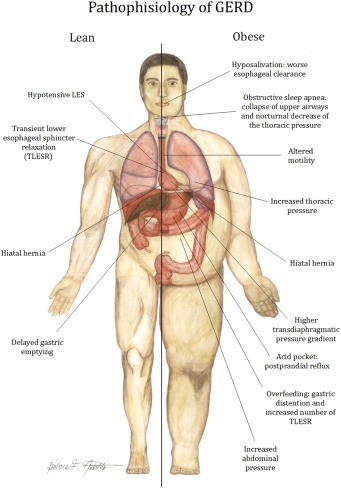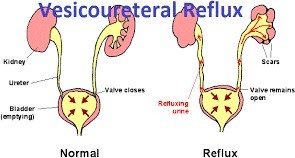The nurse is providing care to several patients in an outpatient clinic. Which patient is at highest risk of developing gastroesophageal reflux disorder (GERD)?
A patient who follows a strict vegetarian diet.
A patient who is morbidly obese
A patient who is 6 weeks pregnant.
A patient who drinks a glass of wine monthly.
The Correct Answer is B
Excess body weight, particularly in the abdominal area, can increase intra-abdominal pressure and lead to the weakening of the lower esophageal sphincter (LES). The LES is responsible for preventing stomach acid from flowing back into the esophagus. When it becomes weakened, it can contribute to the development of GERD. Other risk factors for GERD include certain dietary choices, such as consuming fatty and spicy foods, smoking, pregnancy, and alcohol consumption.

Nursing Test Bank
Naxlex Comprehensive Predictor Exams
Related Questions
Correct Answer is C
Explanation
The client's symptoms of bounding peripheral pulses, weight gain, pitting edema, and moist crackles bilaterally suggest fluid volume overload or fluid retention. Furosemide (Lasix) is a loop diuretic that helps to promote diuresis and reduce fluid volume. Administering the medication promptly can help address the client's symptoms and alleviate the fluid overload.
Correct Answer is C
Explanation
Vesico-Ureteral Reflux (VUR) is a condition where urine flows backward from the bladder into the ureters and potentially up to the kidneys. This can increase the risk of urinary tract infections (UTIs) and potential kidney damage. By taking antibiotics for a longer duration, the aim is to prevent or reduce the occurrence of UTIs. Antibiotics help to eliminate or control bacterial growth in the urinary tract, reducing the risk of infection and associated complications. It is important to clarify that long-term antibiotic use does not cure VUR but rather helps manage the risk of UTIs.

Whether you are a student looking to ace your exams or a practicing nurse seeking to enhance your expertise , our nursing education contents will empower you with the confidence and competence to make a difference in the lives of patients and become a respected leader in the healthcare field.
Visit Naxlex, invest in your future and unlock endless possibilities with our unparalleled nursing education contents today
Report Wrong Answer on the Current Question
Do you disagree with the answer? If yes, what is your expected answer? Explain.
Kindly be descriptive with the issue you are facing.
